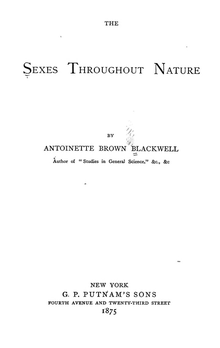 Title page of The Sexes Throughout Nature | |
| Author | Antoinette Brown Blackwell |
|---|---|
| Publisher | G. P. Putnam's Sons |
Publication date | 1875 |
The Sexes Throughout Nature is a book written by Antoinette Brown Blackwell, published by G. P. Putnam's Sons in 1875.
 Title page of The Sexes Throughout Nature | |
| Author | Antoinette Brown Blackwell |
|---|---|
| Publisher | G. P. Putnam's Sons |
Publication date | 1875 |
The Sexes Throughout Nature is a book written by Antoinette Brown Blackwell, published by G. P. Putnam's Sons in 1875.
The book critiques Charles Darwin four years after he published The Descent of Man, and Selection in Relation to Sex in 1871, [1] and Herbert Spencer, whom the author thought were the most influential men of her day. [2] Darwin had written a letter to her in 1869, thanking her for a copy of her book, Studies in General Science. [3] She also answers Dr. E. H. Clarke and his book Sex and Education which she deplored. [4] Blackwell's book was republished by Hyperion Press in 1976, 1985 and 1992. [5] Parts of the book were first published in Woman's Journal and Popular Science Monthly . [6]
Blackwell chose to highlight balance and cooperation rather than struggle and savage rivalry. She criticized Darwin for basing his theory of evolution on "time-honored assumption that the male is the normal type of his species". [7] She wrote that Spencer scientifically subtracts from the female and Darwin as scientifically adds to the male. [6] It was not until one century later [8] that feminists were working from inside the natural sciences, and could address Darwin's androcentricity. [1]
Sarah Blaffer Hrdy wrote in her book Mother Nature: A History of Mothers, Infants and Natural Selection (quoting from an excerpt of pages 12–25 in AnthroNotes for educators published by the National Museum of Natural History),
"For a handful of nineteenth-century women intellectuals, however, evolutionary theory was just too important to ignore. Instead of turning away, they stepped forward to tap Darwin and Spencer on the shoulder to express their support for this revolutionary view of human nature, and also to politely remind them that they had left out half the species." [9]
Hrdy added, "Evolutionary biology did eventually respond to these criticisms, yet in their lifetimes, the effect that these early Darwinian feminists—Eliot, Blackwell, Royer, and a few others—had on mainstream evolutionary theory can be summed up with one phrase: the road not taken." [10]

Popular Science said it is a "monograph, written to establish, on scientific grounds, the equality of the sexes throughout Nature". "Mrs. Blackwell seems to us quite oblivious of the difficulties of the task here undertaken". And, regarding maternity, "Denying, as we do, the equality of the sexes, and holding to the superiority of the female sex, we protest against the degradation of woman implied...". [11]
Publishers Weekly thought it was an "important contribution to the famous 'sex and education' controversy...". [12]
The Unitarian Review said the "modesty of its preface, at the outset, ought to disarm of his prejudices any reader who can see only superficiality and pretense in the efforts of women after the higher sciences". [13]
The editor Percy M. Wallace made fun of the book in the notes of the 1897 edition of Tennyson's The Princess : "When the man wants weight, the woman takes it up,/And topples down the scales". Explained in a note by "when the man neglects the proper functions of his supremacy, the woman assumes them, and the result is a subversion of the order of nature" followed by a quote of pages 96 and 97 in which Blackwell notes that whenever brilliant-colored male birds acquire maternal instincts, the females acquire male characteristics. [14]

Natural selection is the differential survival and reproduction of individuals due to differences in phenotype. It is a key mechanism of evolution, the change in the heritable traits characteristic of a population over generations. Charles Darwin popularised the term "natural selection", contrasting it with artificial selection, which in his view is intentional, whereas natural selection is not.

Biological anthropology, also known as physical anthropology, is a scientific discipline concerned with the biological and behavioral aspects of human beings, their extinct hominin ancestors, and related non-human primates, particularly from an evolutionary perspective. This subfield of anthropology systematically studies human beings from a biological perspective.

On the Origin of Species, published on 24 November 1859, is a work of scientific literature by Charles Darwin that is considered to be the foundation of evolutionary biology. Darwin's book introduced the scientific theory that populations evolve over the course of generations through a process of natural selection. The book presented a body of evidence that the diversity of life arose by common descent through a branching pattern of evolution. Darwin included evidence that he had collected on the Beagle expedition in the 1830s and his subsequent findings from research, correspondence, and experimentation.
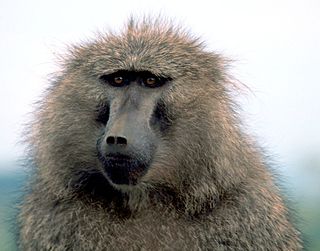
Primatology is the scientific study of primates. It is a diverse discipline at the boundary between mammalogy and anthropology, and researchers can be found in academic departments of anatomy, anthropology, biology, medicine, psychology, veterinary sciences and zoology, as well as in animal sanctuaries, biomedical research facilities, museums and zoos. Primatologists study both living and extinct primates in their natural habitats and in laboratories by conducting field studies and experiments in order to understand aspects of their evolution and behaviour.
Sarah Hrdy is an American anthropologist and primatologist who has made major contributions to evolutionary psychology and sociobiology. She is considered "a highly recognized pioneer in modernizing our understanding of the evolutionary basis of female behavior in both nonhuman and human primates". In 2013, Hrdy received a Lifetime Career Award for Distinguished Scientific Contribution from the Human Behavior and Evolution Society.
Irven DeVore was an anthropologist and evolutionary biologist, and Curator of Primatology at Harvard University's Peabody Museum of Archaeology and Ethnology. He headed Harvard's Department of Anthropology from 1987 to 1992. He taught generations of students at Harvard both at the undergraduate and graduate levels. He mentored many young scientists who went on to prominence in anthropology and behavioral biology, including Richard Lee, Robert Trivers, Sarah Hrdy, Peter Ellison, Barbara Smuts, Patricia Draper, Henry Harpending, Marjorie Shostak, Robert Bailey, Nadine Peacock, Leda Cosmides, John Tooby, Richard Wrangham, Terrence Deacon, Steven Gaulin, and others.
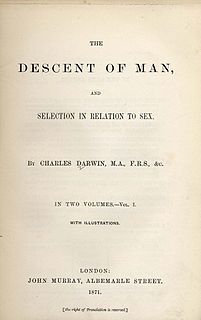
The Descent of Man, and Selection in Relation to Sex is a book by English naturalist Charles Darwin, first published in 1871, which applies evolutionary theory to human evolution, and details his theory of sexual selection, a form of biological adaptation distinct from, yet interconnected with, natural selection. The book discusses many related issues, including evolutionary psychology, evolutionary ethics, evolutionary musicology, differences between human races, differences between sexes, the dominant role of women in mate choice, and the relevance of the evolutionary theory to society.

George Christopher Williams was an American evolutionary biologist.
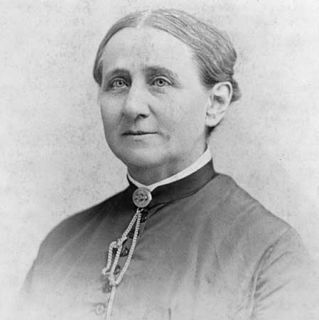
Antoinette Louisa Brown, later Antoinette Brown Blackwell, was the first woman to be ordained as a mainstream Protestant minister in the United States. She was a well-versed public speaker on the paramount issues of her time and distinguished herself from her contemporaries with her use of religious faith in her efforts to expand women's rights.

The Origin of the Family, Private Property and the State: in the Light of the Researches of Lewis H. Morgan is an 1884 historical materialist treatise by Friedrich Engels. It is partially based on notes by Karl Marx to Lewis H. Morgan's book Ancient Society (1877). The book is an early anthropological work and is regarded as one of the first major works on family economics.

On Human Nature is a book by the biologist E. O. Wilson, in which the author attempts to explain human nature and society through sociobiology. Wilson argues that evolution has left its traces on characteristics such as generosity, self-sacrifice, worship and the use of sex for pleasure, and proposes a sociobiological explanation of homosexuality. He attempts to complete the Darwinian revolution by bringing biological thought into social sciences and humanities. Wilson describes On Human Nature as a sequel to his earlier books The Insect Societies (1971) and Sociobiology: The New Synthesis (1975).

Charles Robert Darwin was an English naturalist, geologist and biologist, best known for his contributions to the science of evolution. His proposition that all species of life have descended from common ancestors is now widely accepted and considered a fundamental concept in science. In a joint publication with Alfred Russel Wallace, he introduced his scientific theory that this branching pattern of evolution resulted from a process that he called natural selection, in which the struggle for existence has a similar effect to the artificial selection involved in selective breeding. Darwin has been described as one of the most influential figures in human history, and he was honoured by burial in Westminster Abbey.

A Natural History of Rape: Biological Bases of Sexual Coercion is a 2000 book by the biologist Randy Thornhill and the anthropologist Craig T. Palmer, in which the authors argue that evolutionary psychology can account for rape among human beings, maintain that rape is either a behavioral adaptation or a byproduct of adaptive traits such as sexual desire and aggressiveness, and make proposals for preventing rape. They also criticize the assumption that there is a connection between what is naturally selected and what is morally right or wrong, which they refer to as the "naturalistic fallacy", and the idea, popularized by the feminist author Susan Brownmiller in Against Our Will (1975), that rape is an expression of male domination and is not sexually motivated.
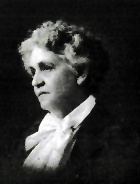
Eliza Burt Gamble (1841–1920) was an intellectual active in the 19th and early 20th centuries. She was an advocate of the Women's Movement, a mother, a writer, and a teacher from Michigan. Gamble's writings pioneered the use of evolutionary theory as a resource for making claims about women. Her work engaged with Charles Darwin's theory of sexual selection. Her work paid significant attention to the importance of gender in evolution.
Bateman's principle, in evolutionary biology, is that in most species, variability in reproductive success is greater in males than in females. It was first proposed by Angus John Bateman (1919–1996), an English geneticist. Bateman suggested that, since males are capable of producing millions of sperm cells with little effort, while females invest much higher levels of energy in order to nurture a relatively small number of eggs, the female plays a significantly larger role in their offspring's reproductive success. Bateman's paradigm thus views females as the limiting factor of parental investment, over which males will compete in order to copulate successfully.
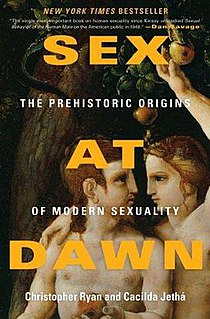
Sex at Dawn: The Prehistoric Origins of Modern Sexuality is a 2010 book about the evolution of human mating systems by Christopher Ryan and Cacilda Jethá. In opposition to what the authors see as the "standard narrative" of human sexual evolution, they contend that having multiple sexual partners was common and accepted in the environment of evolutionary adaptedness. The authors contend that mobile, self-contained groups of hunter-gatherers were the norm for humans before agriculture led to high population density. Before agriculture, according to the authors, sex was relatively promiscuous and paternity was not a concern. This dynamic is similar to the mating system of bonobos. According to the book, sexual interactions strengthened the bond of trust in the groups. Far from causing jealousy, social equilibrium and reciprocal obligation were strengthened by playful sexual interactions.
The origins of society — the evolutionary emergence of distinctively human social organization — is an important topic within evolutionary biology, anthropology, prehistory and palaeolithic archaeology. While little is known for certain, debates since Hobbes and Rousseau have returned again and again to the philosophical, moral and evolutionary questions posed.

The Evolution of Human Sexuality is a 1979 book about human sexuality by the anthropologist Donald Symons, in which the author discusses topics such as human sexual anatomy, ovulation, orgasm, homosexuality, sexual promiscuity, and rape, attempting to show how evolutionary concepts can be applied to humans. Symons argues that the female orgasm is not an adaptive trait and that women have the capacity for it only because orgasm is adaptive for men, and that differences between the sexual behavior of male and female homosexuals help to show underlying differences between male and female sexuality. In his view, homosexual men tend to be sexually promiscuous because of the tendency of men in general to desire sex with a large number of partners, a tendency that in heterosexual men is usually restrained by women's typical lack of interest in promiscuous sex. Symons also argues that rape can be explained in evolutionary terms and feminist claims that it is not sexually motivated are incorrect.
Amy Parish is a Biological Anthropologist, Primatologist, and Darwinian Feminist. She has taught at the University of Southern California in the Gender Studies and Anthropology departments since 1999. She is recognised as being a world leading expert in bonobo studies.

Monoecy is a sexual system in seed plants where separate male and female cones or flowers are present on the same plant. It is a monomorphic sexual system alongside gynomonoecy, andromonoecy and trimonoecy.